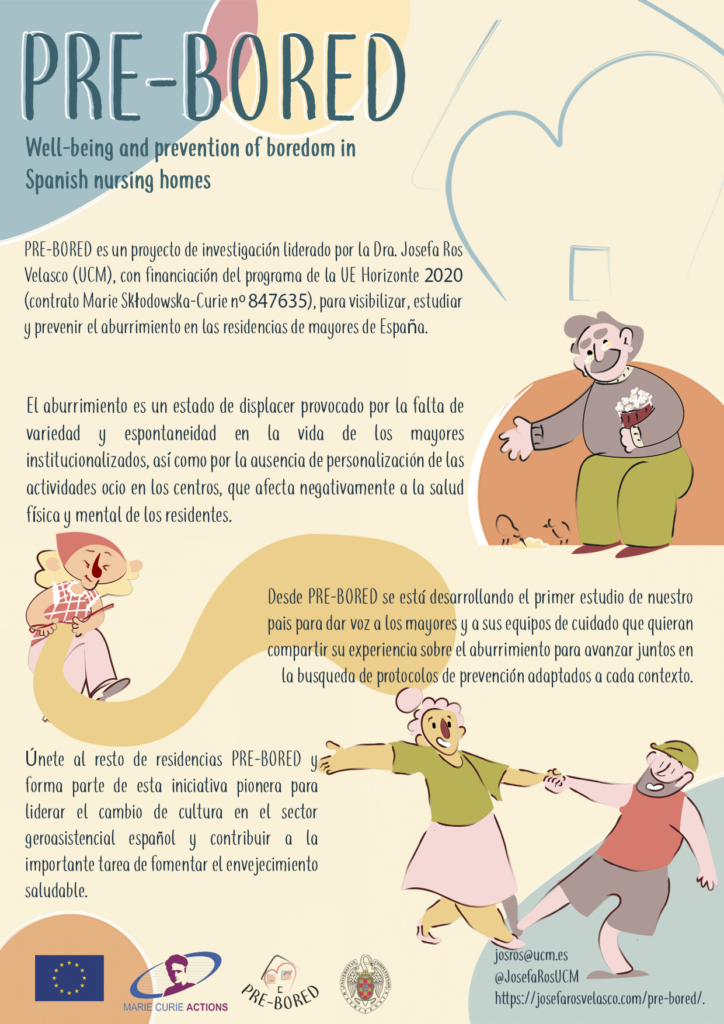PRE-BORED. Well-being and prevention of boredom in Spanish nursing homes


This post tells the story of a dream that is becoming a reality and is also a call for participation for those who wish to share it. Some years ago, I had no choice but to familiarise myself with the reality of those institutions in which many elderly people are forced - because no one chooses to do so if they can avoid it - to spend the last years of their lives: nursing homes.
When I was a teenager, I witnessed my grandparents' ageing process, one that reduced their physical and mental capacities to the point of making it impossible for them to remain in their own homes. Their institutionalisation was irremediable and took place in the worst conditions imaginable. They moved into their new home under duress and without the slightest will to continue living.
Although my grandfather soon saw his plan to embrace the end fulfilled, my grandmother slowly faded away within the walls of her prison. Her most frequent lament was engraved in my memory.
-I'm bored, I'm bored all the time! -she used to complain.
Did boredom consume my grandmother? Did it perpetuate her unhappiness to exhaustion? Why was my grandmother so bored? And, was there nothing anyone could do to alleviate her pain? These questions distressed me in the days after her death. In fact, I never really got rid of them. They were forever seated in my thoughts.
When I decided to specialise in the question of boredom, it was not because I needed to come to terms with my own tedium. On the contrary, it was a reaction to the boredom of others; the boredom that some people cannot get rid of in any way because of the very situation that causes them boredom.
I would have thought that my grandmother had a particular problem with boredom had it not been for the fact that her companions in the residence shared the same gesture: that of utter despair in the face of the lack of meaning that characterised her days. They did not suffer from a pathology of chronic boredom; they were not all sick.
However, their boredom was constant. We all get bored from time to time, being involved in situations or activities that are uninspiring, uninteresting, repetitive or forced, insignificant, after all, that do not respond to our needs for cognitive arousal. We usually escape from the discomfort they cause us by abandoning them and changing them for more rewarding ones.
Sometimes we get stuck in this state for quite a while, especially when we can't find the key to make it easier to move on to the next thing, to the new, or we are not allowed to disengage from the source of boredom. I am thinking, for example, of cases where we feel boredom while queuing (and we don't have our smartphone with us to entertain us). The only thing left to do is to wait for our turn. Any change made to the situation could take us away from our ultimate goal. We held on, after all, for a compelling reason.
None of this had anything to do with what I observed in the residence. The reality was much more complicated. The people living there were incapable of putting an end to their weariness. They knew exactly what they wanted to do to end their boredom. In their minds they devised escape strategies from boredom, but they could not put them into practice, and they lacked that compelling reason to hold on to in order to stoically endure the pain.
In nursing homes there is what I have defined as "chronic situational boredom" in my book "The Boredom Disease". It is an experience of dysfunctional boredom that remains chronic over time, without those who suffer from it being able to leave it behind, because the context in which they find themselves immersed does not favour the implementation of the escape strategies that they elaborate in their own minds to achieve it.
Those who are condemned to suffer such terrible punishment cannot react to their chronic situational boredom because they depend on others to fulfil their purposes. Political and institutional decision-makers who have prioritised security, obtained through routinisation, standardisation and repetition, to the detriment of the spontaneity, personalisation and variety needed to live a life without boredom; a life worth living.
Older people living in nursing homes cannot react to their boredom, but their boredom made me react to it. I began to document myself through studies that showed how boredom undermined their physical and mental health, being directly responsible for the development of mood disorders leading to irritation, frustration and nervousness, sometimes reflected in aggressive behaviour, sleep and eating disorders, depression and even suicidal ideation, as well as a decrease in their functional and cognitive abilities.
I then realised that this was not an isolated problem, but one that affected a good percentage of care homes around the world. In some countries attention was being paid to the issue, although I am not aware of any real measures having been taken to tackle it, beyond a few cases in which they have tried to implement the philosophy of The Eden Alternative, which I was fortunate enough to learn about during my years as a researcher at Harvard University. In Spain, we had been completely silent on this issue.
Why was nothing being done to remedy this difficulty? Perhaps those in charge of taking a step forward were unaware of its existence - I doubt it very much. Perhaps they were aware of it but did not know how to deal with it, because the issue of boredom is not a trivial one. In any case, at that precise moment, I knew that I wanted to dedicate myself body and soul to combating this plague of residential life, first in Spain and then beyond.
In 2020, when I started writing this blog, I developed a research project entitled "PRE-BORED. Well-being and prevention of boredom in Spanish nursing homes", with the aim of obtaining funding to analyse how this complex phenomenon affected the well-being and quality of life of elderly people living in our nursing homes and to try to find ways to prevent their pain, by raising awareness of the problem it represents and the eventual development of prevention protocols adapted to the specific needs and resources of each centre.
I designed a proposal that included several phases to achieve these objectives. Everything had to start with an initial effort to raise awareness among the agents involved in the care of institutionalised elderly people of the importance of preventing boredom in care homes. Without this, everything else was meaningless. I needed to share what I knew with the care sector, which until recently had been unknown to me, using whatever tools were available to me.
Then, once I had captured their attention, the goal would be to conduct a field study in some of our care homes to find out from the peer care teams - which, following the terminology of The Eden Alternative, include managers, workers, family members and the elderly themselves - what the experience of boredom is like in our centres, detect the nature of the problem and jointly explore possible options to find a solution to this risk factor that jeopardises dignified ageing so much.
As part of this challenge, I had to become thoroughly immersed in the philosophy of The Eden Alternative, and even promote it in Spain, for its promoters had been the pioneers in the world in recognising boredom as a problem and offering guidance on how to solve it.
As a culmination, if all of the above were to be fulfilled, I considered that the best thing to do was to complete the project by drawing up a primary prevention protocol, with all the wisdom acquired during my journey and with the help of all those who had been involved in it, to which the residences could adhere in order to close the doors to boredom in their rooms, before it even manifested itself.
Full of enthusiasm, I submitted my proposal to the UNA4CAREER call at the Complutense University of Madrid, which was then launching the European Union's Horizon 2020 programme for the first time as part of the Marie Skłodowska-Curie Actions. A year later, I was lucky enough to win one of their contracts to make PRE-BORED a reality.
During the long months of waiting, I took the opportunity to talk about the project in all the spaces I could find - including those opened to me by this International Centre on Aging: conferences, seminars, magazines, blogs, informal talks... I managed to arouse curiosity in many forums - and I hope to continue to do so. At the same time, I started to be trained in the principles of The Eden Alternative, becoming a mentor and certified educator of this great family.
After half a year of work -since I got the MSCA contract- to prepare the ground and the materials to undertake the field study, finally, the moment of truth has arrived, to find out if the message has been heard deeply enough so that some centres, committed to leading the change of culture in the elderly care sector in Spain, join this pioneering initiative that is PRE-BORED, with which we are going to contribute to the important task of promoting a healthy old age.
This is the first official appeal I am making to the entire gerontological and geriatric community in our country to ask for the collaboration of those who want to join PRE-BORED, helping to spread its message, disseminating the results of the project achieved so far or opening the doors of their centres to continue advancing in the research through participation in the field study.
Many of you are already doing your bit by doing the former and the latter - I am infinitely grateful! However, it is now time for action. As I write these words, I am pleased to announce that three Spanish residential chains have shown interest in taking the plunge. Who else is ready to take up the fight against boredom?

Contact the Lead Researcher of the PRE-BORED project, Dr. Josefa Ros Velasco, for more information or to arrange a meeting:
Email: josros@ucm.es
Web: www.josefarosvelasco.com/pre-bored/
Twitter: @JosefaRosUCM







